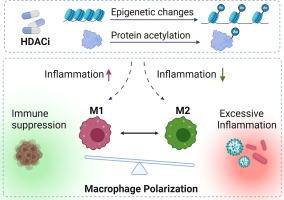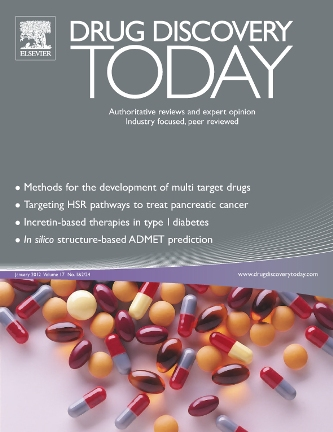Impact of HDAC inhibitors on macrophage polarization to enhance innate immunity against infections
IF 7.5
2区 医学
Q1 PHARMACOLOGY & PHARMACY
引用次数: 0
Abstract
Innate immunity plays an important role in host defense against pathogenic infections. It involves macrophage polarization into either the pro-inflammatory M1 or the anti-inflammatory M2 phenotype, influencing immune stimulation or suppression, respectively. Epigenetic changes during immune reactions contribute to long-term innate immunity imprinting on macrophage polarization. It is becoming increasingly evident that epigenetic modulators, such as histone deacetylase (HDAC) inhibitors (HDACi), enable the enhancement of innate immunity by tailoring macrophage polarization in response to immune stressors. In this review, we summarize current literature on the impact of HDACi and other epigenetic modulators on the functioning of macrophages during diseases that have a strong immune component, such as infections. Depending on the disease context and the chosen therapeutic intervention, HDAC1, HDAC2, HDAC3, HDAC6, or HDAC8 are particularly important in influencing macrophage polarization towards either M1 or M2 phenotypes. We anticipate that therapeutic strategies based on HDAC epigenetic mechanisms will provide a unique approach to boost immunity against disease challenges, including resistant infections.

HDAC 抑制剂对巨噬细胞极化的影响,以增强抗感染的先天免疫力。
先天免疫在宿主抵御病原体感染的过程中发挥着重要作用。它涉及巨噬细胞极化为促炎 M1 或抗炎 M2 表型,分别影响免疫刺激或抑制。免疫反应过程中的表观遗传变化有助于先天性免疫对巨噬细胞极化的长期印记。越来越明显的是,组蛋白去乙酰化酶(HDAC)抑制剂(HDACi)等表观遗传调节剂可通过定制巨噬细胞极化以应对免疫应激源,从而增强先天性免疫。在这篇综述中,我们总结了目前有关 HDACi 和其他表观遗传调节剂在感染等免疫成分较强的疾病中对巨噬细胞功能影响的文献。根据疾病的具体情况和所选择的治疗干预措施,HDAC1、HDAC2、HDAC3、HDAC6 或 HDAC8 在影响巨噬细胞向 M1 或 M2 表型极化方面尤为重要。我们预计,基于 HDAC 表观遗传机制的治疗策略将提供一种独特的方法来增强免疫力,以应对疾病挑战,包括耐药性感染。
本文章由计算机程序翻译,如有差异,请以英文原文为准。
求助全文
约1分钟内获得全文
求助全文
来源期刊

Drug Discovery Today
医学-药学
CiteScore
14.80
自引率
2.70%
发文量
293
审稿时长
6 months
期刊介绍:
Drug Discovery Today delivers informed and highly current reviews for the discovery community. The magazine addresses not only the rapid scientific developments in drug discovery associated technologies but also the management, commercial and regulatory issues that increasingly play a part in how R&D is planned, structured and executed.
Features include comment by international experts, news and analysis of important developments, reviews of key scientific and strategic issues, overviews of recent progress in specific therapeutic areas and conference reports.
 求助内容:
求助内容: 应助结果提醒方式:
应助结果提醒方式:


